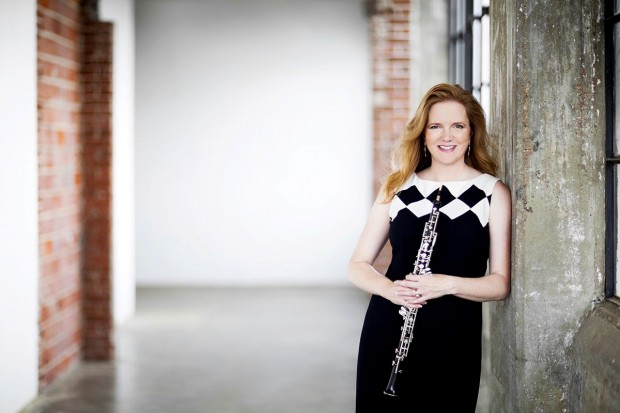Name That Tune: Alecia Lawyer

Alecia Lawyer, founder and artistic director of ROCO, always finds a way to make music accessible for the masses, even in COVID times. ROCO’s latest installment at Buffalo Bayou is her most recent idea. They are taking music to the audience when the audience cannot come to the music. Alecia has been an oboist and arts entrepreneur for almost her entire life and sees it as her job to innovate classical music for modern audiences. Read on for excerpts from our interview. Watch her video to see if you can name the tune.
Profession: Founder and Artistic Director of ROCO and Oboist
Instrument: Oboe
How long have you been playing the oboe?
I’ve been playing since the 4th grade. My whole life!
Did you start off with the oboe?
I did, which is rare. Most people start with the flute or clarinet and then switch to oboe. But my dad was the band director, so he started me off with oboe.
Did your dad have a big influence on you growing up?
Absolutely! My dad was the band director, and my mom was the choir director. I was an only child, and I had mom for second period and dad for third period through high school. But I never wanted to be a musician until I got to college. But God had it in the plans. I was planning on pursuing physics, but I switched at the last minute. My parents encouraged me to always do what I wanted.
What made you change your mind and pursue music?
I was playing the oboe throughout high school, and I was ready to go to UT for physics. But my oboe teacher in Dallas wouldn’t let me stop playing. My last lesson right before college she asked me if I would consider going to SMU for music. Her husband taught there. And it was so crazy! It was a last-minute switch. So I went to SMU for undergrad and then I went to Juilliard for my Masters. And they were both in Oboe Performance.
What was your experience at Juilliard?
It’s as competitive as you’d think. I got so much experience and played a ton of gigs. I got to hone my skills. But there are not many jobs out there. So you have to learn how to be an entrepreneur. Only lately are schools starting to teach that to students. Now, I do a ton of consulting about that – how to be an entrepreneur in the arts.
Can you tell me more about ROCO's background?
Sure! I started ROCO in 2005. I was a part of three different startup organizations that had really good ideas and I coalesced a lot of those ideas into ROCO. Also, my church, St. John the Divine, renovated and we finally had a great space. Houston was lacking a great space for chamber orchestra. So, we are the only professional chamber orchestra around. When I started ROCO, I experimented with ideas – earlier concert times, child music education before and after concert. Really experimenting with a whole different format! We’ve been livestreaming for seven years. It was not hard to pivot when COVID hit. We are constantly pushing the envelope with things we are doing – like the ROCO installment at Buffalo Bayou. Because we have done a lot of experimenting, and seen what has failed and what’s been successful, people are calling for advice from our experience.
What is the difference between a chamber orchestra and a symphony orchestra?
A symphony orchestra is about 90 to 100 players. We have the same instruments in our group, but it’s only about 40 players. Symphony orchestras are more prevalent in Mozart’s time. But there is tons of music for chamber orchestra that doesn’t get played because you don’t need a massive hall. Where we play seats about 400 people and it’s more intimate. You can really hear each individual instrument.
What do you have coming up for ROCO?
The QR code installment at Buffalo Bayou has been huge for us. It has massive potential. Already, there are people calling us from all over with interest. There’s no limit to it! We have some more coming out in January. We truly are going to permeate the city with music. People who have phones can scan the code and listen for free! One of the campaigns we are doing for our annual fund is with a certain amount donation, we will put a QR code in your yard of your favorite piece. Also, we are constantly exploring with how technology and how it can connect us better. I’ve always experimented with technology. We have an app, and we ask you to be on your phone and to use your phone during the concert. We have live notes during the concert where you can communicate and connect directly with the music. It’s a horrible shakeup what has happened in our field. It’s awful. But it is going to make people pivot in ways they haven’t before.
What do you want people to know about the classical music world?
I want people to feel like they can take a chance and not like something. I want them to know they have permission to not like it. That’s what’s missing in classical music. My audience takes that chance now. They are willing to go on that journey with us, in a way that is exploratory. You don’t have to know anything about classical music to come to a concert. You don’t need to be intimidated. We want people to come and join in the dialogue with us.
Editor's note: Read more about the ROCO installment here.
Want more buzz like this? Sign up for our Morning Buzz emails.
To leave a comment, please log in or create an account with The Buzz Magazines, Disqus, Facebook, or Twitter. Or you may post as a guest.



